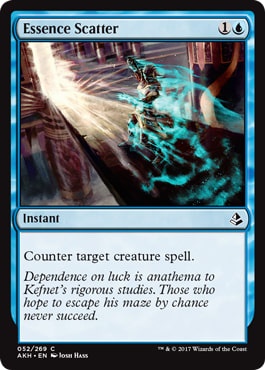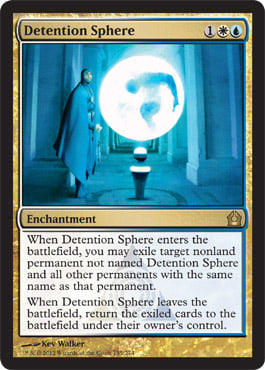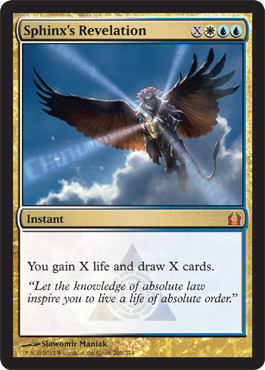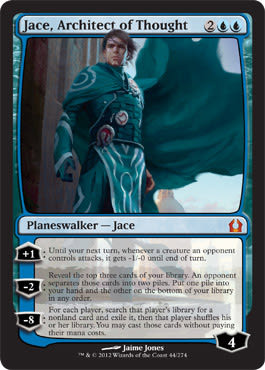Now that the Standard environment has officially changed, I’ve been testing a number of different new decks. My current favorite is W/U control—so much so that as I write this, I’m planning to play it at the StarCityGames Standard Open in Worcester this Sunday (what’s now this past Sunday when this is published). The build isn’t anything mind-bendingly innovative, but the key with the deck is playing it correctly, which can be quite challenging. When I’ve discussed Standard decks in the past, my focus has been more on the design decisions involved. This time, I’ll be shifting my focus toward how to make the correct play decisions with the deck.
Here is the deck list I’m planning to run:
"W/U Control"
- Creatures (3)
- 3 Aetherling
- Planeswalkers (5)
- 1 Elspeth, Sun's Champion
- 4 Jace, Architect of Thought
- Spells (24)
- 4 Azorius Charm
- 4 Essence Scatter
- 4 Sphinx's Revelation
- 4 Syncopate
- 4 Supreme Verdict
- 4 Detention Sphere
- Lands (28)
- 8 Island
- 8 Plains
- 4 Azorius Guildgate
- 4 Hallowed Fountain
- 4 Mutavault
As you can see, it makes very little use of new cards from Theros or Magic 2014. It’s largely a Return to Ravnica Block deck with a few key reprints from M14, such as Essence Scatter and Mutavault. Like many control decks, the key lies at least as much in how you make use of the contents of the deck as it does in the actual contents. The other key here is the changes of the metagame surrounding this deck. While I’ve been able to build a Standard deck like this one for quite some time, the metagame wasn’t right for it. With the format rotating, however, there will be an inevitable changing of the guard at the top of the metagame. As I prepare to play this deck in Sunday, my hope and belief is that W/U control is now much better placed in the metagame.
Essence Scatter – Being able to play first is a really big deal with this deck. In most matchups, the long game will favor you, so ideally, you’d like to counter your opponent’s first creature even if you have a Supreme Verdict in your hand. Keep your life total high while building up your mana, and save your Verdict for later. In the midgame, when you make it to 6 mana, you can play Verdict or Jace with the ability to counter the opponent’s next creature, which will usually allow you to enter the next turn in pretty good control of the game. It’s important to be hyperaware of whether your opponent is playing with Aetherling or Stormbreath Dragon because these are critical creatures to counter. If you believe your opponent is playing with them, be extremely careful about using up your counters and about tapping out once he or she has enough mana to start casting them.
Syncopate – Much like Essence Scatter, this card allows you start countering threats on turn two. In the early game, it’s usually better to counter with a Scatter first and save your Syncopate in case the opponent plays a planeswalker or some other important noncreature later. In the late game, it’s usually better to counter things with Syncopate and save your Scatters to allow you to play expensive spells with a hard counter backup that the opponent can’t play around as he or she could against Syncopate.
Azorius Charm – The primary ability of the Charm you’ll be making use of is the ability to put a creature on top of your opponent’s library. You take two turns of pressure off yourself, and you can even counter that creature later. The ability to draw a card is the next most common. If you’re mana-stalled or in need of a specific card, you should use the Charm to dig. This is especially true if most of your opponent’s threats are cards that the Charm isn’t useful against, such as Aetherling or Stormbreath Dragon. Upon occasion, you might have cause to use the third ability. In a close game in which you’re racing with a difficult threat, gaining 8 life with an Aetherling can be a major difference maker.
Detention Sphere – One of the big principles of playing this deck is, “Don’t be greedy.” If you counter the opponent’s first creature, feel free to Sphere his or her next creature. Making one-for-one plays is fine for you in the early game because cards such as Jace and Sphinx's Revelation will give you card advantage later. If you suspect your opponent has planeswalkers and you have other options for dealing with his or her creatures, it’s usually good to try to save a Sphere in case he or she plays a planeswalker. If playing against B/G, avoid depending on Spheres to deal with the opponent’s biggest threats—an Abrupt Decay will eventually ruin your day.
Supreme Verdict – This is one of the biggest cornerstones of the deck. The problem your opponent faces is that in order to beat Revelation, he or she needs to play a lot of pressure to quickly overwhelm you. Yet, if the opponent does that, he or she is walking right into Verdict. While it’s nice to kill a swarm of creatures with Verdict, feel free to merely kill two or even just one very big one. Be aware of which creatures your opponent has in his or her deck that you can’t kill any other way, such as hexproof creatures or creatures with protection from white or from blue. Try to save your Verdict until the opponent puts one of those threats into play. If you reveal a Verdict with Jace, feel free to take it even though you may already have one in hand if your opponent is heavily reliant on creatures. In mirror matches, this card will often be dead, but it’s often correct to keep one in after boarding in case the opponent brings in creatures.
Sphinx's Revelation – Many people choose to run just three of this card because of the spell’s extremely heavy mana requirement. I like to run four because drawing the first one is crucial and because then I can use one in the midgame for 2 or for 3, knowing I’ll probably draw another one soon. See: Don’t be greedy. This card is one of the few cards in the deck that will often make me keep a six-land hand.
Aetherling – The biggest reason I didn’t run W/U control at the Ravnica Block Constructed Pro Tour was that I didn’t fully appreciate what a fantastic game-ender this card is. Since you’re running three of them, feel free to play them aggressively. If your opponent doesn’t appear to have the kind of removal to kill a large creature, feel free to tap out and play one when you make it to 6 mana. You’ll then have a creature that you can make unblockable to kill a planeswalker, and it can attack and block, and it can even be protected from your own Verdicts. Resolving one of these is the key to the mirror match. Once it’s in play, it’s pretty much impossible to deal with unless its controller decides to tap out.
Elspeth, Sun's Champion – This card is in the deck because of its versatility and because it gives you another victory path. Since its function isn’t essential, since it’s a legend, and since it’s expensive, Elspeth is only a one-of. Against big creature decks, it’s much like a fifth Verdict. In the mirror match, it’s another threat the opponent needs to counter but that can’t be countered with Essence Scatter.
Jace, Architect of Thought – Like Revelation, this card is among the deck’s key sources of card advantage. In the optimal scenario, you’ll be able to play it and add a counter, knowing that your opponent will be unable to bring it below 3 counters before your next turn. In that scenario, you will be able to reduce Jace by 2 counters on your next turn and then hope to clear the board with a Verdict, thus protecting yourself and your Jace. In a less ideal scenario, you should play Jace and immediately remove 2 counters. Not only will you replace Jace with either two cards or the best of the next three cards in your deck, but you’ll most likely avoid some damage as your opponent takes the time to kill Jace.
Mutavault – Since your deck needs both ![]()
![]() and
and ![]()
![]() , there are obvious risks to running these. They usually more than make up for their drawback though. First, they give you a good way to deal with opposing planeswalkers. Second, they give you another answer to opposing Mutavaults, and third, they’re excellent in the mirror match, where it’s hard to resolve threats.
, there are obvious risks to running these. They usually more than make up for their drawback though. First, they give you a good way to deal with opposing planeswalkers. Second, they give you another answer to opposing Mutavaults, and third, they’re excellent in the mirror match, where it’s hard to resolve threats.
If it seems that this deck might be a good fit for you, there are a few key things to keep in mind. Protect your life total aggressively early. Don’t be greedy. Be aggressive. Understand what your opponent’s most dangerous threats are, and be sure you’re prepared for them. Be patient. Be selective about when you tap out. Remember that the fact that you might not have anything good in your hand doesn’t mean your opponent realizes that. Be prepared to keep mana-heavy opening hands, and oh yeah: Don’t be greedy.



























